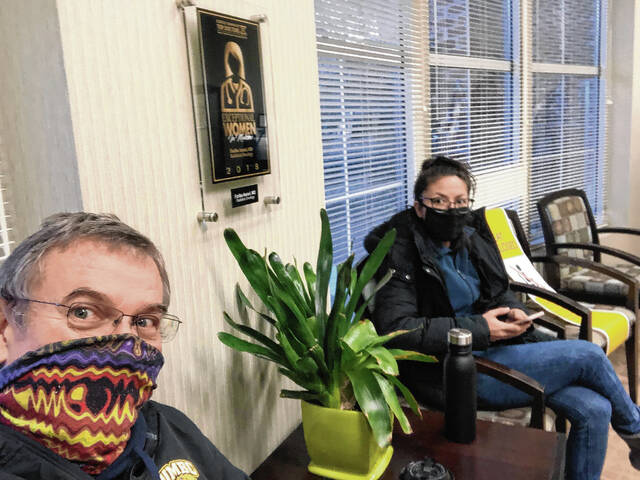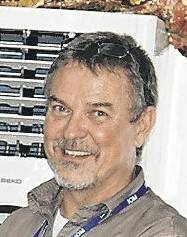Johns Hopkins Kimmel Cancer Center is one of the best treatment facilities in the world, perhaps the very best for prostate cancer.
I flew from Florida to Baltimore, Maryland, in February for consultations with two specialists.
At the radiation oncologist’s office, I entered the waiting room early one morning just as an elderly man was being called back. He stood and left his wife to guard his coat and sock cap. Every other seat in the room was marked off for COVID-19 measures, so I took a seat well behind the wife in the otherwise vacant waiting area.
She turned around and looked at me as I began to check my phone. I suspect in my hoodie, I looked threatening to her. Perhaps there had been a spate of assaults or robberies in her neck of the woods lately by gray-haired, 62-year-old men in hoodies. Or maybe she just thought I was an unnecessary COVID-19 infection risk.
Whatever the motive, she stood up, grabbed her and her husband’s coats and caps and moved to the far end of the waiting area where she could keep an eye on me. Her husband’s sock cap fell to the floor before she could sit down.
“You dropped the hat,” I told her. I can be very helpful when I want to be.
She stopped, pivoted and glared at me. Then her gaze went to the floor. She hesitated, as if wondering if the cap was really worth it somehow, and then picked it up without a word.
My youngest daughter came in a few minutes later from parking the car. One benefit of my recent diagnosis has become the fact that I have gotten to spend time with three of my four daughters. Over the past few years, I have come to realize more and more that enjoying time with family is one of life’s greatest gifts. The family usually gathers during the holidays at our place in Florida each year. I love for them to come and hate for them to leave.
Living overseas makes visiting more frequently difficult and expensive. Every year, I asked myself if this should be my last year overseas. Should I switch to part-time remote work from Florida, where I can travel to Indiana and Maryland more frequently to visit family or should I tough out one more season? I love my work, my career, my bosses (I have several) and my staff. The work is very rewarding.
I used to tell my kids when they were growing up to get an education so they can find the career they love and would do for free if they could afford it. To get paid for doing what you would do for free is one of life’s greatest blessings.
Last spring, the day before I was supposed to leave Florida to arrive in Honduras — well before the cancer diagnosis — family had gathered from Indiana and Maryland for a few days. My son had grilled out, and we were eating. The kids and my wife were all talking and laughing, the grandkids joking and chattering. Two or three conversations were going on around the room at the same time. I was silently listening and observing, something I rarely do.
Supper spilled into an Uno game when suddenly, an illuminating and peaceful realization washed over me: This was a snapshot of my retirement. I was no longer the center of attention. I no longer had to lead the conversation or even comment on topics. I would just sit back, relax and enjoy my offspring.
The love of my life: My children and grandchildren. They were unwittingly taking the baton from here. I had done my job, for better or for worse. I had raised them as best as I could, helped to education them and nurture them, screwed up time and again, embarrassed them, encouraged them, lent them support and wisdom on occasion.
But I no longer had to lead them. It was now out of my hands. They were going to be fine without me. The road had been long and hard.
For years and years, we had lived hand to mouth, rushed to sporting events and practices, battled through the teen years, drug overdoses and automobile accidents, unexpected pregnancies and glorious childbirths, purchased used cars and paid for college tuition, used appliances, cheap clothes, car seats and dental bills. We had adopted grandchildren.
And I was weary. It was OK to slow down. This was one of the most peaceful moments I have ever experienced.
So now, a year and a cancer diagnosis later, I am faced with the same dilemma: Transition to part time at the end of the year or one more season?
A radiation oncology nurse led my daughter and me back to an examination room. The primary oncologist’s associate entered and interviewed me, taking notes on a tablet. He left and returned with the primary oncologist. They explained my condition and answered all of my questions. They were thoughtful and professional, laying out the three options: Active surveillance, surgery and radiation.
Although they were talking about a potential cure through radiation, the oncologist explained the potential side effects: Incontinence, impotence, frequent urination, rectal bleeding. Whatever the patient’s condition is now, “It is only going to get worse, not better.”
There are, in fact, no good options. There is no real benefit to getting cancer, except for getting to see family more or some other silver lining that only an optimist can glean. Each of the three options has its advantages and disadvantages. But no one survives unscathed.
But survival is survival. And cure is cure. And prostate cancer, if caught early, is much less lethal than, say, a heart attack or a stroke. Thanks to the advances of modern medicine over the past two decades, there are options.
And I am pretty much content to take what life gives me, always have been. In fact, I remember having failed an interview for a job in Washington, D.C., many years ago because when one of the panelists asked me a question about an impossible situation, I answered, “When life gives you lemons, you make lemonade.”
He didn’t like that answer, and he told me so. “What you should have said,” he informed me, “is public-private partnerships.”
Well, I couldn’t argue with that. Especially because at the time, I had no idea what public-private partnerships were.
The radiation oncologist then asked me, “Do you mind if I examine your prostate?”
“No, go ahead,” I responded.
My daughter excused herself, and I proceeded to drop my drawers and bend over the examination table so he could probe with his finger. When he was done, he asked, “Do you mind if my associate, Doctor… examines your prostate?”
“Sure,” I said. “The more the merrier.”
Craig Davis, who was born in Seymour and graduated from Brownstown Central High School, currently lives in Tegucigalpa, Honduras, and works for a U.S. government contractor on school-based violence prevention. He is the author of “The Middle East for Dummies” and is conducting research for a genealogy and social history book in Kurtz and Freetown. You can visit the Living with Cancer weekly blog at MarvinGray.org and write him at [email protected].


